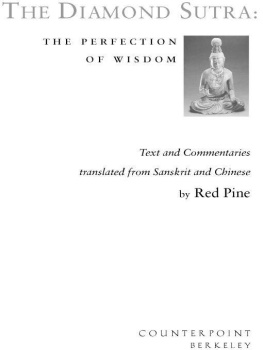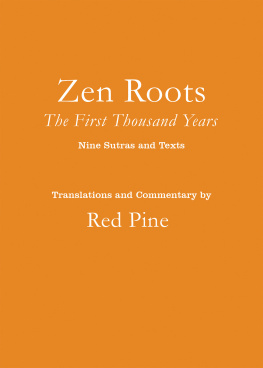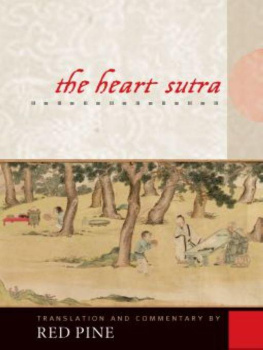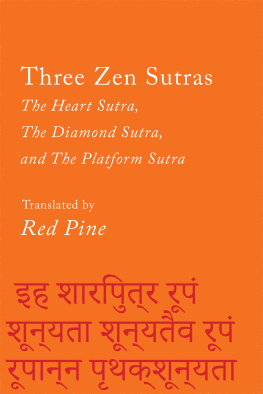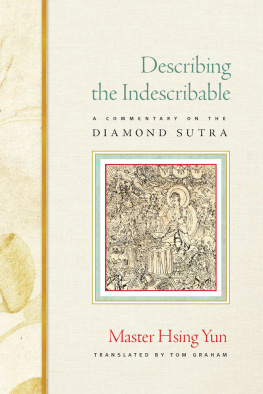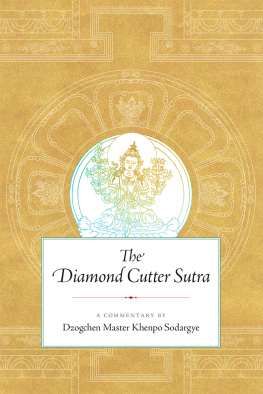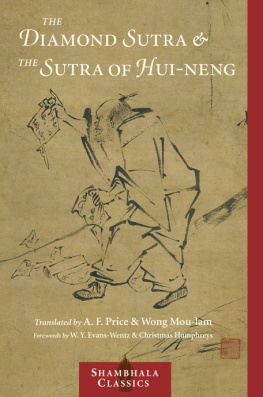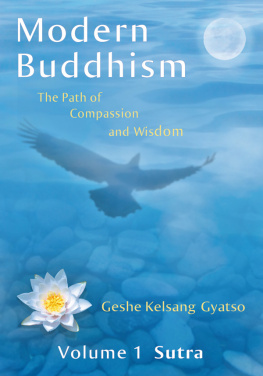Table of Contents
ALSO BY RED PINE
Lao-tzus Taoteching
The Collected Songs of Cold Mountain
The Zen Teaching of Bodhidharma
Guide to Capturing a Plum Blossom
The Zen Works of Stonehouse
The Clouds Should Know Me By Now
(edited with Mike OConnor)
THE DIAMOND SUTRA: THE PERFECTION OF WISDOM
ONE: Thus have I heard: Once the Bhagavan was dwelling near Shravasti at Anathapindada Garden in Jeta Forest together with the full assembly of 1250 bhikshus and a great many fearless bodhisattvas.
One day before noon, the Bhagavan put on his patched robe and picked up his bowl and entered the capital of Shravasti for offerings. After begging for food in the city and eating his meal of rice, he returned from his daily round in the afternoon, put his robe and bowl away, washed his feet, and sat down on the appointed seat. After crossing his legs and adjusting his body, he turned his awareness to what was before him.
A number of bhikshus then came up to where the Bhagavan was sitting. After touching their heads to his feet, they walked around him to the right three times and sat down to one side.
TWO: On this occasion, the venerable Subhuti was also present in the assembly. Rising from his seat, he uncovered one shoulder and touched his right knee to the ground. Pressing his palms together and bowing to the Buddha, he said: It is rare, Bhagavan, most rare, indeed, Sugata, how the Tathagata, the Arhan, the Fully-Enlightened One blesses fearless bodhisattvas with the best of blessings. And it is rare, Bhagavan, how the Tathagata, the Arhan, the Fully-Enlightened One entrusts fearless bodhisattvas with the greatest of trusts.
Even so, Bhagavan, if a noble son or daughter should set forth on the bodhisattva path, how should they stand, how should they walk, and how should they control their thoughts?
The Buddha told the venerable Subhuti, Well said, Subhuti. Well said. So it is, Subhuti. It is as you say. The Tathagata blesses fearless bodhisattvas with the best of blessings and entrusts fearless bodhisattvas with the greatest of trusts. You should therefore truly listen, Subhuti, and consider this well. I shall tell you how those who set forth on the bodhisattva path should stand, how they should walk, and how they should control their thoughts.
The venerable Subhuti answered, May it be so, Bhagavan, and gave his full attention.
THREE: The Buddha said to him, Subhuti, those who would now set forth on the bodhisattva path should thus give birth to this thought: However many beings there are in whatever realms of being might exist, whether they are born from an egg or born from a womb, born from the water or born from the air, whether they have form or no form, whether they have perception or no perception or neither perception nor no perception, in whatever conceivable realm of being one might conceive of beings, in the realm of complete nirvana I shall liberate them all. And though I thus liberate countless beings, not a single being is liberated.
And why not? Subhuti, a bodhisattva who creates the perception of a being cannot be called a bodhisattva. And why not? Subhuti, no one can be called a bodhisattva who creates the perception of a self or who creates the perception of a being, a life, or a soul.
FOUR: Moreover, Subhuti, when bodhisattvas give a gift, they should not be attached to a thing. When they give a gift, they should not be attached to anything at all. They should not be attached to a sight when they give a gift. Nor should they be attached to a sound, a smell, a taste, a touch, or a dharma when they give a gift. Thus, Subhuti, fearless bodhisattvas should give a gift without being attached to the perception of an object. And why? Subhuti, the body of merit of those bodhisattvas who give a gift without being attached is not easy to measure. What do you think, Subhuti, is the space to the east easy to measure?
Subhuti replied, No, it is not, Bhagavan.
The Buddha said, Likewise, is the space to the south, to the west, to the north, in between, above, below, or in any of the ten directions easy to measure?
Subhuti replied, No, it is not, Bhagavan.
The Buddha said, So it is, Subhuti. The body of merit of those bodhisattvas who give a gift without being attached is not easy to measure. Thus, Subhuti, those who set forth on the bodhisattva path should give a gift without being attached to the perception of an object.
FIVE: What do you think, Subhuti, can the Tathagata be seen by means of the possession of attributes?
Subhuti replied, No, indeed, Bhagavan, the Tathagata cannot be seen by means of the possession of attributes. And why not? Bhagavan, what the Tathagata says is the possession of attributes is no possession of attributes.
This having been said, the Buddha told the venerable Subhuti, Since the possession of attributes is an illusion, Subhuti, and no possession of attributes is no illusion, by means of attributes that are no attributes the Tathagata can, indeed, be seen.
SIX: This having been said, the venerable Subhuti asked the Buddha, Bhagavan, will there be any beings in the future, in the final epoch, in the final period, in the final five hundred years of the dharma-ending age, who give birth to a perception of the truth of the words of a sutra such as that spoken here?
The Buddha said, Subhuti, do not ask, Will there be any beings in the future, in the final epoch, in the final period, in the final five hundred years of the dharma-ending age, who give birth to a perception of the truth of the words of a sutra such as that spoken here? Surely, Subhuti, in the future, in the final epoch, in the final period, in the final five hundred years of the dharma-ending age, there will be fearless bodhisattvas who are capable, virtuous, and wise who give birth to a perception of the truth of the words of a sutra such as that spoken here.
Indeed, Subhuti, such fearless bodhisattvas will have honored not just one buddha, and they will have planted auspicious roots before not just one buddha. Surely, Subhuti, such fearless bodhisattvas will have honored countless hundreds and thousands of buddhas, and they will have planted auspicious roots before countless hundreds and thousands of buddhas. In the words of a sutra such as that spoken here, they are sure to gain perfect clarity of mind. The Tathagata knows them, Subhuti, by means of his buddha knowledge. And the Tathagata sees them, Subhuti, by means of his buddha vision. The Tathagata is aware of them, Subhuti. For they all produce and receive a measureless, infinite body of merit.
And how so? Because, Subhuti, these fearless bodhisattvas do not create the perception of a self. Nor do they create the perception of a being, a life, or a soul. Nor, Subhuti, do these fearless bodhisattvas create the perception of a dharma, much less the perception of no dharma. Subhuti, they do not create a perception nor no perception.
And why not? Because, Subhuti, if these fearless bodhisattvas created the perception of a dharma, they would be attached to a self, a being, a life, and a soul. Likewise, if they created the perception of no dharma, they would be attached to a self, a being, a life, and a soul.
And why not? Because surely, Subhuti, fearless bodhisattvas do not cling to a dharma, much less to no dharma. This is the meaning behind the Tathagatas saying, A dharma teaching is like a raft. If you should let go of dharmas, how much more so no dharmas.
SEVEN: Once again, the Buddha asked the venerable Subhuti, What do you think, Subhuti? Did the Tathagata realize any such dharma as unexcelled, perfect enlightenment? And does the Tathagata teach any such dharma?

